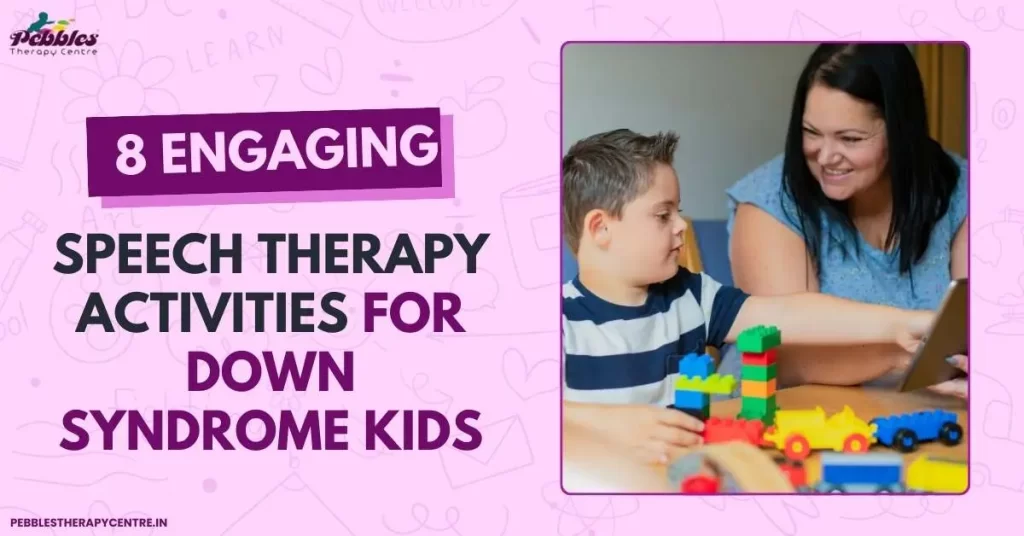8 Engaging Speech Therapy Activities for Down Syndrome Kids
Engagement is the key to effective learning, especially for children with Down syndrome. Creating activities that captivate their attention while addressing their specific speech therapy needs is essential for their progress and development. For children with Down syndrome, speech therapy exercises are not merely about learning to speak. They serve as keys to unlocking avenues of self-expression, fostering confidence, and nurturing social interactions. In this blog, we aim to present the 8 Engaging Speech Therapy Activities for Down Syndrome.
These speech therapy techniques for down syndrome aren’t just strategies; they represent strides towards a future where every child’s voice is not only heard but also celebrated. Join us on this journey as we explore the harmonious blend of words and gestures that lies ahead.
What is Down Syndrome?
Understanding Down Syndrome and Speech Therapy
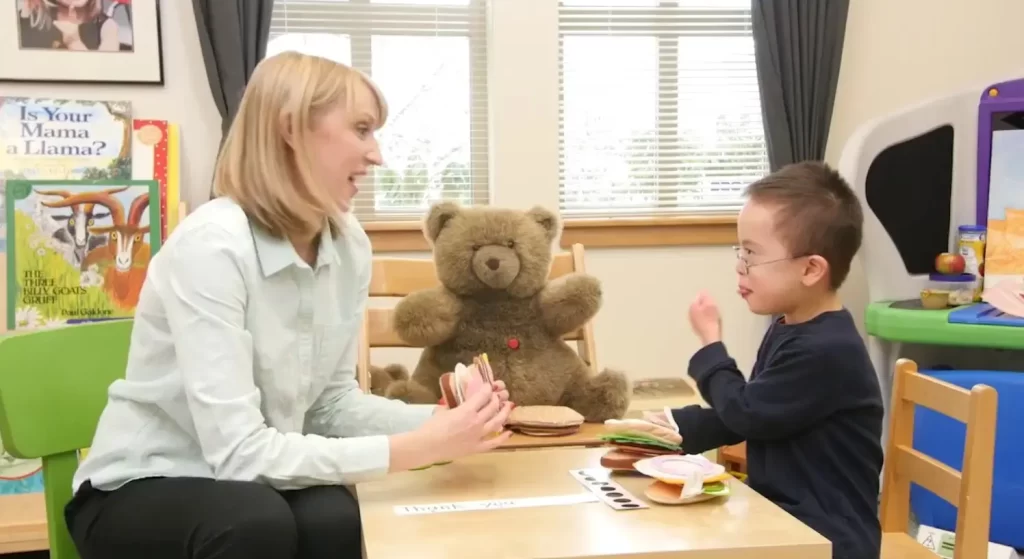
Down syndrome speech therapy is quite similar to speech therapy for other reasons, but there are special considerations to keep in mind during treatment. The therapist begins by evaluating how the children with Down syndrome communicates and their strengths and challenges in communication.
Sometimes, speech therapy activities for Down syndrome might involve addressing possible hearing loss, which is common in children with this condition. Ensuring effective communication is key, whether the person is just starting to talk, needs help with words, or relies on other forms of communication.
Just like everyone else, individuals with Down syndrome have unique communication needs, so speech therapy for Down syndrome should be customized to meet those specific needs.
How does Down's Syndrome affect Speech and Language development?
Down syndrome affects speech and language development because it affects how children grow mentally and physically. Kids with Down syndrome often have trouble with talking, understanding words, and putting sentences together. This happens because of differences in their mouth and face shape, muscle strength, and sometimes hearing problems. But with early help and special support, they can improve.
Speech and language therapy for Down syndrome is very important for dealing with these challenges. Therapists work closely with kids to help them talk better, learn more words, and find other ways to express themselves if they need to. By giving personalized help and using good techniques, speech and language therapy for Down syndrome helps kids get past difficulties and be better at talking and getting along with others.
8 Best Speech Therapy Activities for Down Syndrome Kids
Learning speech therapy exercises, specially made for the children with Down syndrome, will do a lot of good for their growth and communicational efficacy. Let’s see the 8 most alluring Best Speech Therapy Activities that will help kids with Down syndrome to become more proficient talkers and writers by addressing their special needs.
1. Storytime with Props
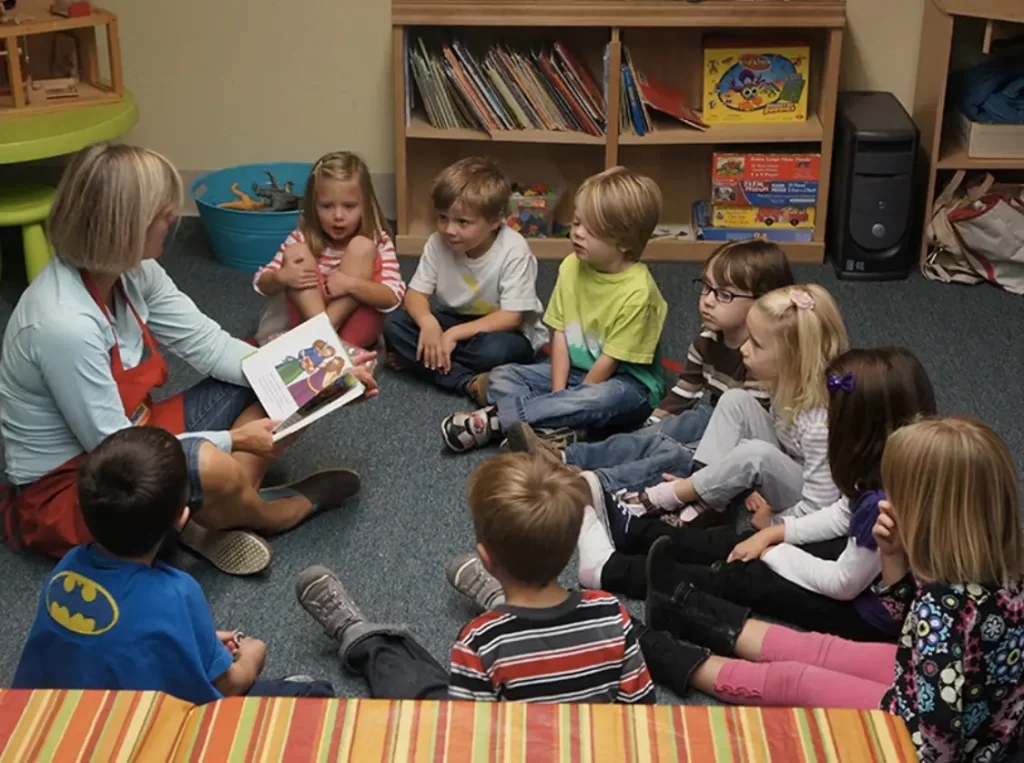
Offer toddlers with Down syndrome interactive storytelling activities in which the engagement is enhanced with colorful props and visuals to foster their comprehension and communication skills. Employ puppets, toys and picture books to make the tale become more lively which will lead the kids to participate and to learn the language. Through this speech therapy activity for toddlers with Down syndrome, children´s creativity and imagination are boosted while engaging in oral motor exercises needed for production of speech.
2. Music and Rhyme
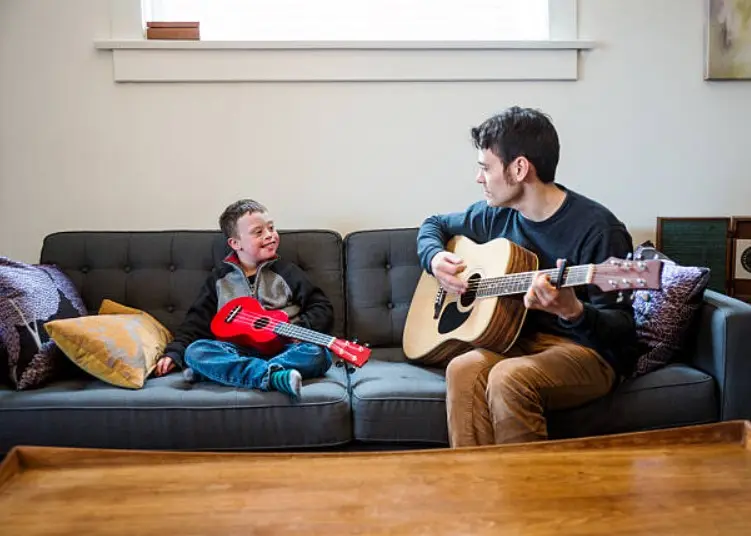
Include the various types of rhythmic activities and sing-alongs to help language and speech progress in children with Down syndrome. By utilizing the words from simple songs and nursery rhymes, articulation and phonological awareness are improved. This vibrant and playful approach to speech therapy for Down syndrome stimulates auditory discrimination and motor coordination, and hence learning is not only fun but also result oriented.
3. Puppet Play
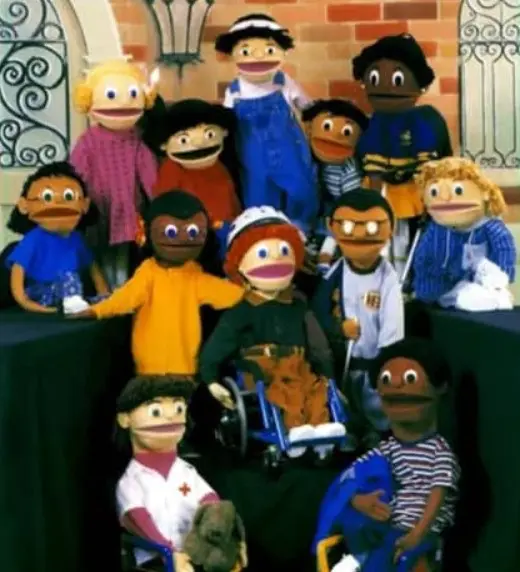
Leverage puppets as engaging aids in speech therapy sessions for Down syndrome children. Encourage interaction and communication through puppet role-play, fostering language expression and social skills. This speech therapy activity for Down syndrome encourages oral motor exercises while nurturing creativity and emotional expression.
4. Sign Language
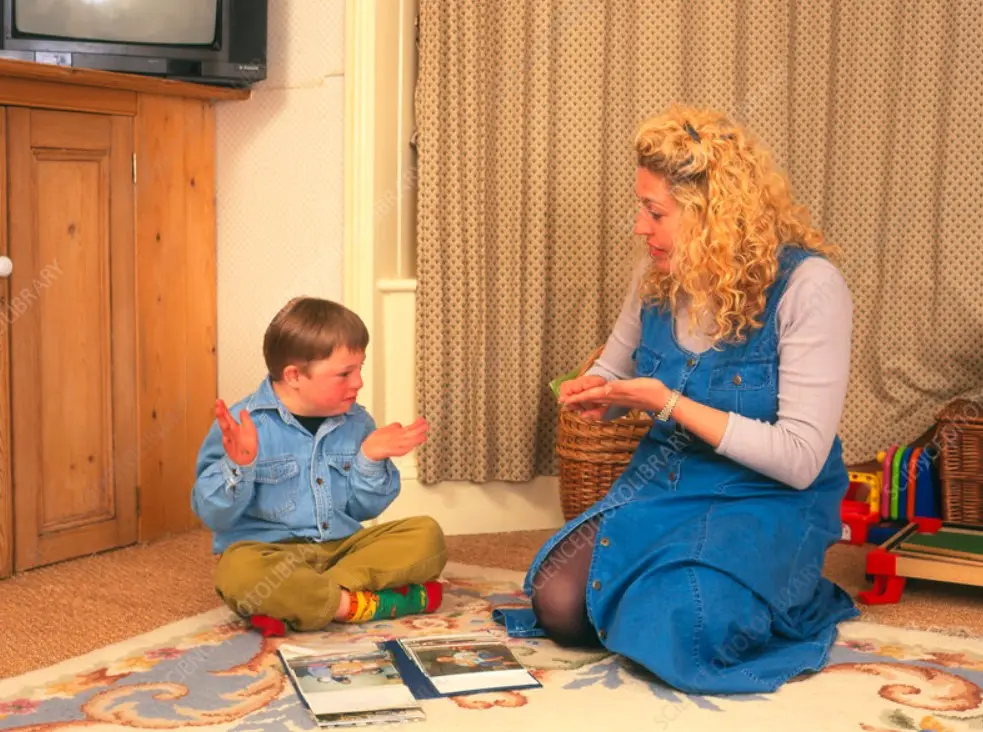
Introduce basic sign language to facilitate communication alongside verbal expression for Down syndrome children. Teaching common signs aids understanding and expressing needs and desires. Integrating sign language into speech therapy activities for toddlers with Down syndrome enhances communication skills and boosts confidence.
5. Grammar Exercises
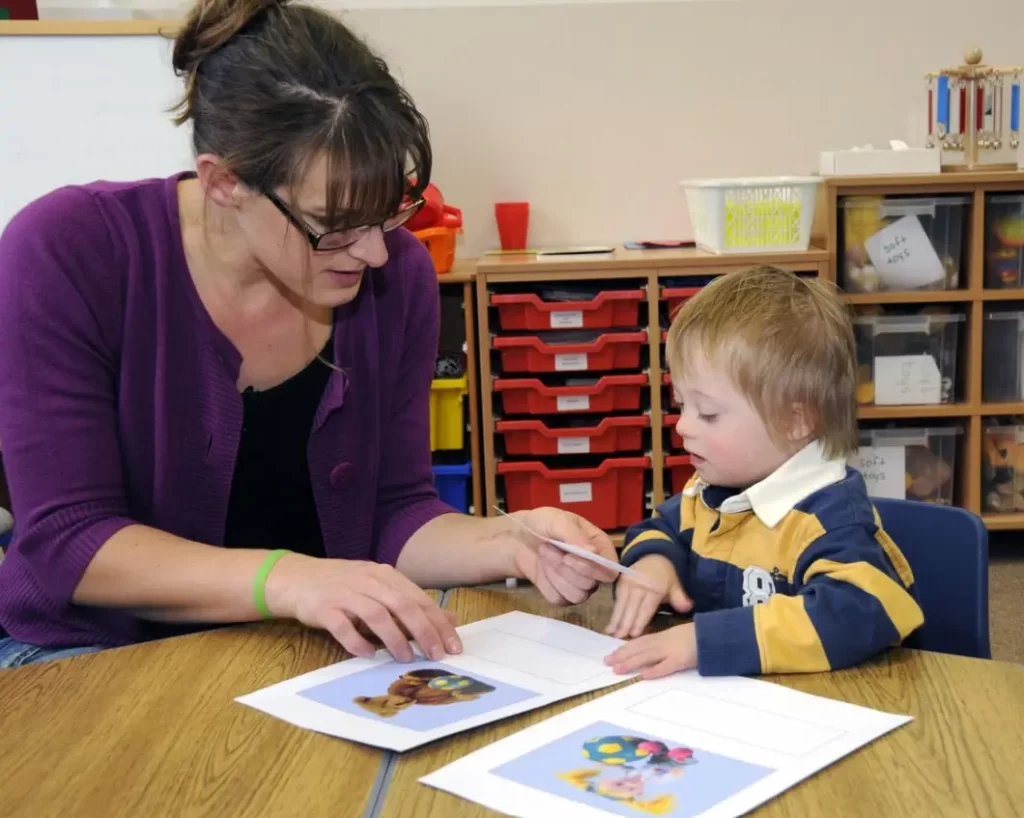
Incorporate enjoyable grammar activities tailored to the developmental level of Down syndrome children. Visual aids and simple sentence structures facilitate basic grammar concept comprehension. This speech therapy activity for Down syndrome focuses on language comprehension and expression, laying a solid communication foundation.
6. Journaling and Storytelling

Encourage Down syndrome children to participate in journaling and storytelling to refine language skills and self-expression. Providing prompts and visuals supports narrative development and organization. This speech therapy for Down syndrome promotes literacy and encourages creative communication.
7. Role-Playing
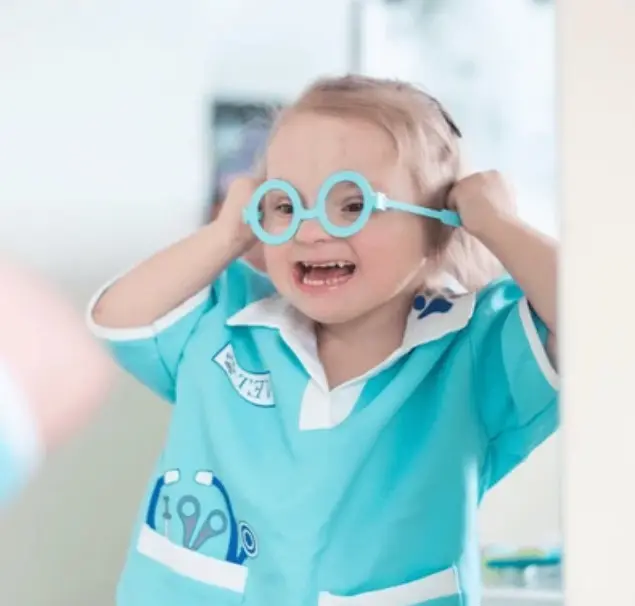
Guide role-playing scenarios to help Down syndrome children practice social communication and problem-solving. Real-life situations and props make activities meaningful and engaging. This interactive speech therapy activity for Down syndrome encourages language growth and boosts confidence in social interactions.
8. Outdoor Exploration
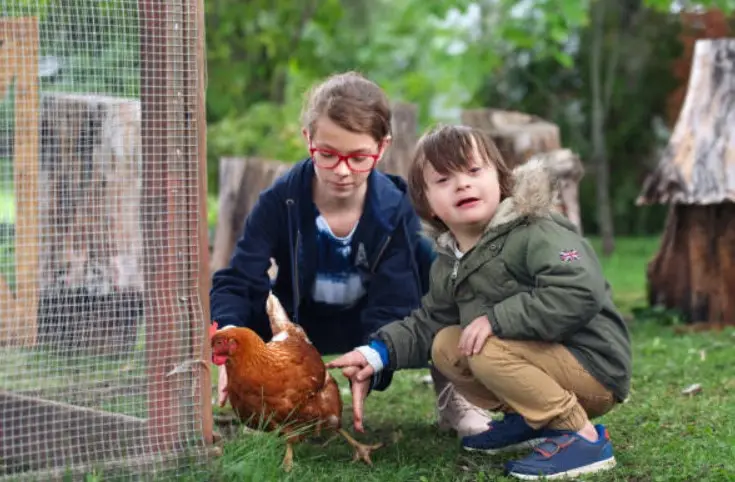
Take speech therapies to the outdoors to have language-rich stimulation and create a sensory-infused environment for children with Down syndrome. Nature walks, games of tag, and scavenger hunts outside are environment that induce language development and enrich vocabulary. Under the umbrella of these speech therapy activities for Down syndrome that involve both physical activities and discovery, children are not only developing language skills but also strengthening their complete growth.
Benefits of Down Syndrome Speech Therapy Activities
Participation in these speech therapy activities is undoubtedly one of the top advantages for Down syndrome children. The speech therapy exercises are customized personally to their communication abilities so that they become more capable of communicating, improving their lives in the long run. Through enjoyable and interactive Down syndrome speech therapy techniques, children develop clearer speech, improved word comprehension, and effective self-expression.
These activities not only strengthen their speech and language abilities but also elevate their confidence and social interactions. By regularly participating in the speech therapy activities for Down syndrome-, kids are benefited due to the fact that they are able to overcome the communication disorders and achieve their full potential.
Therapy sessions utilize a diverse set of down syndrome speech therapy techniques which provide personalized attention by addressing the individualized requirements of each child allowing for a supportive and uplifting environment for learning and growing.
Role of Speech Therapists When Treating Down Syndrome
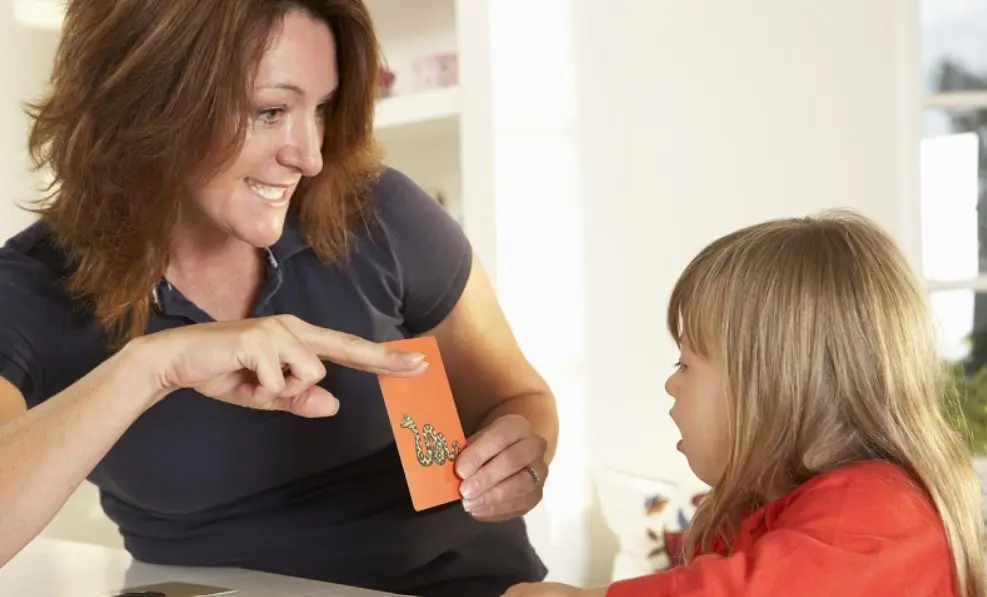
The speech therapists are a group of professionals who offer a thorough support for those who have been diagnosed with Down syndrome, centering on improving their communication and general health. The whole realm of speech and language therapy for Down syndrome comprises a range of individualized strategies prepared to deal with the particular obstacles posed by this disorder. These methods frequently integrate down syndrome speech therapy activities like oral motor exercises, language enhancement games, and targeted communication techniques.
Crafting personalized treatment blueprints, speech therapists aid individuals with Down syndrome in refining articulation, grasping language nuances, and honing social interaction skills. Furthermore, they extend valuable assistance and counsel to families and caregivers, empowering them to foster effective communication within household settings and daily routines. By nurturing self-assurance and autonomy in communication, speech therapists serve as pivotal advocates for the integration and triumph of individuals with Down syndrome within their communities.
FAQs
Children with Down syndrome will be more fluent as sign language gives them the opportunity of another way of gesticulations as it is not a assessable medium; it builds their language skills and social interaction.
Reading is just as important for speech development in children with Down syndrome as it is for everyone else. It is not about just learning word pronunciation correctly; it also helps them in understanding how the language works, how to learn new words, and how to get better at speaking.
An oral motor program brings hope to grow a child’s speech sound production by developing strength in speech organs muscles in order to improve, to have a clearer speech.
Through songs the speech development in young Down syndrome children is aided by the involvement in rhythmic movements, the language learning process and the verbal communication improvement.
The initial speech therapy (between the ages one or two) is initially crucial in enhancing the language and communication skills of children with Down syndrome.
People who are taking care of children with Down syndrome can show them the proper speech by talking slowly, using a simple language, and offering kid a lot of opportunities to talk to parent and imitate it.

